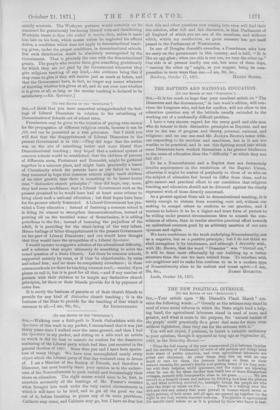[To THE EDITOR OF THE "SPEETATOR1 Sin,—Walking over a field-path
in North Oxfordshire with the Spectator of this week in my pocket, I remembered that it was just thirty years since I walked over the same ground, and then I had the Spectator in my pocket, and sitting on a stile read an article in which it did its best to console its readers for the disastrous scattering of the Liberal party -which had then just occurred in the general election of 1841. Since then you and I have been specta- tors of many things. We have seen accomplished nearly every object which the Liberal party of that day ventured even to dream of. I am a Member of the Society of Friends, and therefore a Dissenter, but most heartily share your opinion as to the endeav- ours of the Nonconformists to push unduly and threateningly their views on education. The right course would seem to be, first, to ascertain accurately all the bearings of Mr. Forster's measure when brought into work under the very varied circumstances in which it will have to be tried, and to get all the good we can out of it, before breaking to pieces any of its main provisions. Cabinets may come, and Cabinets may go, but I have no fear but
that this and other questions now coming into view will find their due solution, after full and fair discussion, in that Parliament of all England of which you are one of the members, and without which, within my recollection, no great measure has got itself passed in the Parliament of Westminster.
In one of Douglas Jerrold's comedies, a Frenchman asks how we carry on the government in this country, and is told, " It is like an egg-glass ; when one side is run out, we turn the other up." Our side is at present hardly run out, but some of these days, " turning the other up" might, as you suggest, bring its com- pensation in more ways than one.—I am, Sir, &c.,


































 Previous page
Previous page